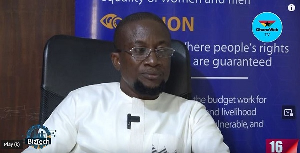Tamale, July 13, GNA - Mr Moses Bukari Mabengba, Northern Regional Minister, has been commended by the Ghana Aids Commission (GAC) for leading the crusade in the fight against the HIV/AIDS pandemic in the region. The Regional Minister has shown personal interest in HIV/AIDS activities and ensured that District Chief Executives (DCE's), in the reg= ion set aside 0.5 percent out of the Common fund allocation meant for HIV/AIDS activities.
He has also participated and taken a keen interest in all HIV/AIDS programmmes in the region and offered himself on more than one occasion for voluntary testing for the disease, as a mark of exemplary leadership and an encouragement for others to emulate Dr Richard Amenyah, Director of Technical Services of the GAC, commended the Regional Minister at a World Bank/GAC Multi-sectoral HIV/AIDS (MSHAP) Programme implementation completion report (ICR) meeting, held with the Regional Aids commission and Civil Society Organisations (CSOs) involve= d in the fight against HIV/AIDs in Tamale, on Tuesday. MSHAP is a five year World Bank funded programme that seeks to bring together social partners in the fight against Aids, by building their capacities and resourcing them to adopt innovative and effective ways to combat the disease. The first phase of the MSHAP, which started in 2005, is ending in 2010 and the World Bank team and officials of the GAC are on a nationwide tour t= o evaluate the impact of the programme and to find out if new strategies coul= d be drawn up for a second phase from 2011 to 2015. Dr Amenyah observed that because of the personal involvement of Mr Mabengba in HIV/AIDs reduction, the region currently has the lowest rate of HIV/AIDs infection in the country, which stood at 0.7 percent. The national percentage is 2 (two) percent while the Eastern region ha= s 3.2 percent the highest in the country.
He reiterated government's determination to continue supporting the efforts of all the social partners in the fight against the HIV/AIDs disease. He said during the teams tour of the country to find out the impact of the MSHAP programme, regions with the low HIV/AIDS prevalence would be supported to maintain their status while those with high percentages would be encouraged to take measures to reduce it. Dr Edward Bos, a leading population specialist of the World Bank, urge= d CSOs and other partners to stop depending solely on foreign funding or interventions in their fight against the HIV/AIDs disease but instead, use the knowledge and skills they had acquired during their capacity building workshops to take ownership of the programme.
Health News of Wednesday, 13 July 2011
Source: GNA
















